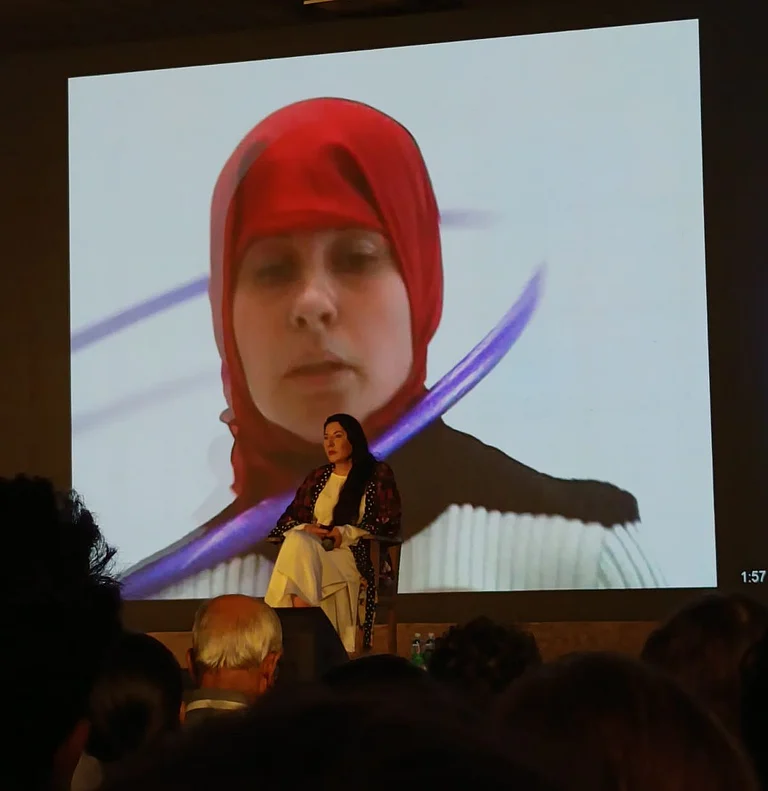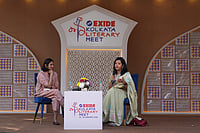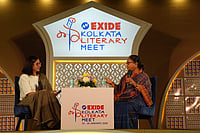The poster of filmmaker Leena Manimekalai’s Kaali, described as a performance documentary, showed a person dressed as goddess Kali smoking a cigarette. As some people found the poster to be offensive to their religious sentiments, Trinamool Congress (TMC) Lok Sabha MP was asked during an interview at a TV channel for her comments on the controversy. Moitra said she visualised goddess Kali as a deity who accepted alcohol and meat and that there existed the practise of offering the goddess meat and alcohol.
Hell broke loose on the MP following her comment, as not only did some people find her comments to have hurt their sentiments but also her own party was quick to distance itself from her comment and condemned her remarks in a rather surprising move.
People whose sentiments were hurt by seeing a person dressed as Kali smoking a cigarette may not be aware that during the height of the swadeshi movement in Kolkata and other parts of West Bengal, in the first decade of the twentieth century, the ‘bishuddho swadeshi’ Kali brand cigarette had gained significant popularity. The Kolkata-based East India Cigarette Manufacturing Company had appealed to ‘Hindu brothers’ in advertisements to smoke Kali cigarettes if they wanted to improve the conditions of the native people. No sentiment was reported to have been hurt in Kolkata, the heartland of Kali worshippers. Etymologists have often suggested that the name Kolkata came from Kalikshetra, or the land of Kali.
While Goddess Kali may not have been seen in any of her avatars to be smoking cigarettes, it’s a different case altogether when it comes to meat and alcohol.
Madyapanapramattikang or intoxicated with consumption of alcohol is how goddess Kali has been visualised in Svatantra-tantra, according to sixteenth-century Tantra practitioner and scholar Krishnananda Agambagish’s book, Brihat Tantrasar. The same book says the Shmashan Kali has been visualised as bamahastena madyapurna samangsakang, or a pot full of meat and wine in her left hand.

In Tarapith, one of West Bengal’s major Shakti peeth located in Birbhum district, the bhog offered to goddess Kali includes fried shol fish, goat meat and karonbari or alcohol. Tara is worshipped as Shyama on the day of Kali puja. Whiskey bottles are offered to the goddess. Devotees are given one drop of alcohol each after it has been offered to the goddess. These are all common knowledge.
Moitra herself had cited the case of Tarapith but such practice of having alcohol as an offering to goddess Kali is no exception in West Bengal. At the famed Shmashan Kali temple at Andharia in the Beliabera area in Jhargram district attracts devotees from Jharkhand and Odisha, the bhog is prepared with goat meat, wax gourd and alcohol. At Siddheshwari Kali puja at Dainhat in East Bardhaman district, alcohol is used in place of Gangajaal and five types of fish are offered as bhog. At Nalateshwari Kali puja in Nalhati of Birbhum district, the bhog includes rice, meat, spinach and alcohol.
Not just in West Bengal, temples established by Bengalis outside the state boundary have similar examples. At the century-old temple of Chhinnamasta, an avatar of Kali, at Rajrappa in Ramgarh district of Jharkhand founded by a Ghosal family, meat and alcohol are mandatory for the puja.
Keeping the temples aside, more than 20,000 community Kali pujas take place in West Bengal and in a majority of such community pujas in makeshift pandals alcohol is used during the puja. The most common practice is to offer country liquor, called Deshi or Bangla, but rum and whiskey are also offered.
Temples of Shmashan Kali, which is worshipped in Hindu crematoriums, and Dakat Kali, another form of Kali puja which was started by dacoits decades ago, are many in West Bengal and alcohol and meat are an integral part of these pujas.
It is, though, not mandatory that alcohol must be offered to the goddess. At Dakshineswar Kali temple where the puja follows Ramakrishna Paramahamsa’s traditions, no meat is offered and coconut water is used instead of alcohol. But they offer five types of fish dishes. Alcohol is not part of the puja at Kolkata’s Kalighat either but goat meat and several types of fish are offered as bhog.
A vegetarian bhog to goddess Kali, as is offered at Adyapith in Kolkata, is also part of the practice. But examples of the use of alcohol and meat will be endless.
All these make the TMC’s condemnation of Moitra’s comments surprising from a party that is born and based in West Bengal, all the more so because the party chief herself is an avowed devotee of Kali and the puja is also organised at her residence. Besides, a majority of TMC leaders in Kolkata and in the districts are involved in the organising of community Kali pujas.
It is difficult to imagine she and her party’s leaders are unaware of the diverse practices of Kali puja observed in the state, especially when it is one of the state’s biggest religious events.
On Tuesday, soon after leaders and supporters of the BJP started targeting Moitra and her party for her comments on Kali, on social media and in statements to the media, stating that it hurt their religious sentiments, the TMC jumped on to condemn her statement.
What did the party think while responding to the controversy? Did it consider whose sentiments were getting hurt? Which side should the party take when one group of Hindus are offended by the practice of another group of Hindus? This is what the party seemingly failed to decide.
The TMC had earlier pegged itself as a force defending Bengal’s cultural and religious practices from northern and western Indian practices of Hinduism. In April 2017, when Ram Navami and Annapurna Puja coincided, and the organisations belonging to the BJP-Rashtriya Swayamsevak Sangh (RSS) camp took out massive Ram Navami processions across the state in an unprecedented scale, the chief minister accused the BJP of imposing alien culture on Bengal and disrespecting Annapurna, who is Bengal’s own.
That Bengali cultural regionalism dominated the TMC’s political moves to a large extent till the 2021 assembly elections when they repeatedly branded the BJP as outsider and Borgi (eighteenth-century Maratha invaders to Bengal). They, however, were often in doubt and did not want to miss out on the devotees of Ram and Hanuman as well and therefore started organising Ram Navami and Hanuman Jayanti themselves, even though they were never major religious events in the state.
However, the party’s national aspirations, as reflected since the 2021 Assembly election victory in its expansion drive outside West Bengal, eying the 2024 Lok Sabha election, seem to have weakened the party’s Bengali regionalist plank so much that they are now even scared to defend their home state’s popular religious practices.


























